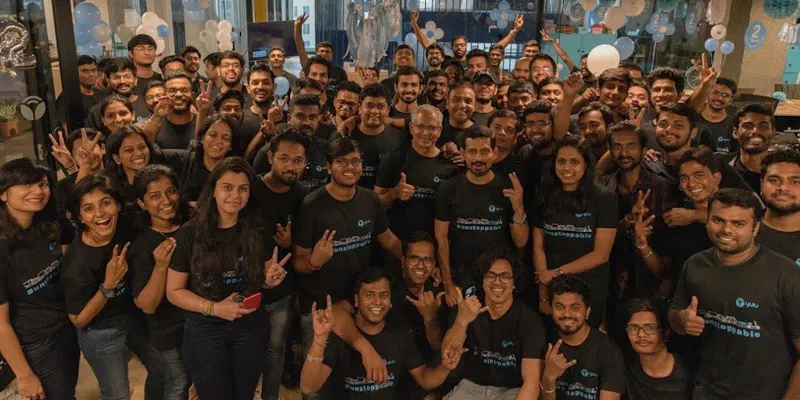
Vodafone
View Brand PublisherHow Vodafone powers Yulu, the IoT-based dockless bike-sharing platform looking to end first and last-mile commuting woes
Yulu offers IoT-based dockless bicycles & electric vehicles to resolve first and last-mile connectivity problems in India. Powered by Vodafone, they plan to expand to a fleet of 100,000 EVs in India by the end 2020 with an aim to become the most dominant micro-mobility player in India.
If you’re tired of bargaining with autorickshaw drivers or surge pricing from taxi operators, the services of bike-sharing platform is just what you need. Yulu offers an eco-friendly UMaaS (Urban Mobility as a Service), which is an affordable, sharable and scalable solution commute option for first mile, last mile, and short distance urban commutes.
With over 10,000 eco-friendly vehicles and 1.6 million users, Yulu runs India’s largest EV-led micro-mobility platform with a mission to create the sustainable cities of tomorrow through its specially designed human and battery-powered vehicles powered by technologies like the Internet of Things (IoT), Machine Learning (ML) and Artificial Intelligence (AI).

Yulu currently operates in four major Indian cities - Bengaluru, New Delhi, Mumbai and Pune, which have a collective population of 65 million people. As pioneers in this space, they have influenced several policies for micro-mobility in India by working closely with policy-makers at the city and national level.
Driving innovations in mobility
So, what exactly is ‘dockless’? Simply put, it means that you can pick up a cycle or a bike from any of the locations the startup operates in by unlocking it with your phone, using it and then dropping it at the nearest Yulu location with no hassles..

As consumers, it is ridiculously easy getting a Yulu bike. You can open the app near a Yulu bike, and unlock it with your phone . What’s more, their EV innovation, Yulu Miracle, is a unique, battery operated, lightweight, easy to ride, two-wheeler that has no legal requirements for the helmet, registration plate or even a driving license to operate. It has enabled individuals to switch to a more efficient commute option at pocket-friendly prices while leaving a zero carbon footprint.
And of course, a lot of tech, strategy and ops are behind Yulu’s click-of-a-button convenience.
“You need to have the right mix of technology and on-ground operations to ensure that everything runs smoothly,” said Amit Gupta, Co-founder and CEO, Yulu.
Tech-ing it to the next level
Behind all these cool features is some pretty amazing tech. Yulu has developed its own vertical stack needed to run its EV fleet. From design and ownership of the assets to charging the batteries to on-ground operations, Yulu has little dependency on external factors.
Yulu also uses IoT, ML and AI to deliver a seamless experience via a user-friendly app. Using IoT as the backbone of operations, the vehicles can be rented seamlessly on a pay-per-use basis. Users can book a ride via the iOS or Android app, and the smart bikes can be unlocked by scanning its QR code, or typing in its vehicle number on the app. Yulu operates on a ‘virtual docking’ method, where Yulu vehicles can be picked up or returned by users from its network of preferred parking spots called Yulu Zones.
Solving the challenge of battery charging infrastructure
Yulu has solved the chicken and egg problem faced by the EV ecosystem in India around charging infrastructure with a low cost and highly scalable solution. They have created a unique battery-swapping network by placing its proprietary IoT enabled charging box, called Yulu Max, at hundreds of mom-n-pop stores across its operational areas. A backend app helps their ops team by displaying vehicles that have a battery-charge level below a defined threshold along with their real-time location so that they can charge the vehicle as and when needed.
Solving for the safety of assets
Yulu Miracle has a theft rate of less than 1%, which is significantly lower than global ride-sharing platforms. This is attributable to Yulu’s operational model of drop-off at designated Yulu Zones, and a human network of local-informers and well-wishers who tip off its ops team in case of any potential incidents of abuse or theft. Further, as the Yulu Miracle was designed specifically for shared mobility, it has no “standard” parts, which could be used in other bikes in the market.There is very little economic incentive for someone to steal them. Additionally, Yulu has deployed a team of ‘bike-marshals’ who ensure strong consequence-management actions when they catch someone doing something wrong with its fleet.
Solving for high durability
Yulu Miracle has been built keeping in mind the convenience of users on Indian roads, the ease of maintenance for the on-ground ops team, and durability to be used in a shared mobility model. The minimal use of plastic parts and regular proactive maintenance activities have ensured that the Miracles are in good working conditions at all times. The first batch of Miracles deployed in Bengaluru, which have been on the roads for over seven months now, have shown no sign of a reduction in asset quality.
How Vodafone’s solutions empower their mobility
Vodafone’s managed IoT connectivity platform gives Yulu the crucial visibility and control of their IoT-enabled vehicles anywhere within their network. The IoT solution helps Yulu track the location of any SIM installed in an asset, alerts them to unusual activity, produces reports on performance and data usage, activates new SIMs and even manages them through their lifecycle.
The Vodafone Location tracker (VLT), deployed on a trial basis, has a user-friendly interface which helps Yulu ascertain the safest and most economically viable routes, access online reports, receive alerts and reduce costs. What’s more, it easily integrates with their CRM (Customer relationship management) and WFM (Workforce Management) to deliver an enhanced experience. Yulu also leverages Vodafone’s voice postpaid connection for cost effective operations.
“Vodafone has greater network coverage in areas we operate in. Their dedicated M2M solution was another deciding factor, as was their quick resolution of issues with root cause analysis. Vodafone’s IoT solution and GDSP platform helped us with easy SIM procurement, deployment, and management, and better security with private APN (Access Point Name). Vodafone’s responsiveness, its focus on customer satisfaction and the quality of its service were the highlights of our relationship with the company. We have found them to be highly responsive and receptive to our requirements,” said Amit.
He added that their overall experience has been extremely positive, with the Vodafone team having been highly receptive, transparent and responsive to their needs, particularly where customised offerings were needed.
Yulu’s challenge was to deliver a competitive solution at scale and develop a state-of-the-art backend system to power it. Vodafone helped Yulu by ensuring 99 percent uptime, and faster resolution of issues with RCS (Rich Communication Services). Vodafone’s IoT solutions helped to establish real-time connectivity and transfer data to the servers that are then used to monitor the vehicles and take preventive measures if necessary. Easy procurement and deployment of SIMs, a dashboard for SIM management and support for API (Application programming interface) to integrate with internal applications helped the Yulu team stay on top of their game.
Accelerating beyond India to the rest of the world
Yulu plans to expand to a fleet of 100,000 EVs across up to seven major cities in India by December 2020. In the long run, they aim to be present in over 100 cities to become the most dominant micro-mobility player in India by using a combination of a company-owned-company-operated and a franchise-owned - franchise-operated model. Part of their expansion plans also involves dual profile SIM cards for their M2M network and 100,000 IoT device deployments by the end of 2020.

By leveraging the scale of the domestic market and strategic partners, Yulu also plans to take its services global through joint ventures in more than ten countries beyond India.
Liked this article? Read more such educative and inspiring stories here







